- Home
- Michael McDowell
The Elementals Page 4
The Elementals Read online
Page 4
“What happened to the husband?” asked India, curious.
“He married again,” said Leigh. “That was Dauphin’s great-great-grandfather, and he was the one who built Beldame.”
Big Barbara began to weep, affected not only by the story but by the declining afternoon, the scotch she had consumed, and her growing sense of loss. Luker, who saw this, kneaded his mother’s thigh with the soles of his feet in comfort.
“So that’s why they don’t push the knife all the way in any more?” said Luker softly.
“That’s right,” said Odessa.
“They just touch the chest with the point of the knife—that’s the symbolic part,” said Leigh. “But then they bury the knife in the dead person’s hands, and that part’s not symbolic. They figure that if they wake up in the coffin, then they can kill themselves with the knife.”
“But wasn’t Marian Savage embalmed?” asked Luker.
“No,” said Big Barbara, “she wasn’t. Bothwell wasn’t embalmed, and so she said she wasn’t going to get it either.”
“Well,” said Luker practically, “if the Savages would all just get themselves embalmed, they wouldn’t have to bother about the knife.”
“You’re a Savage now,” said India to Leigh. “Do you have a knife?”
“No,” said Leigh, surprised—for she had not considered this before. “I don’t have one, I don’t know what they’ll do—”
“Yes, ma’am,” said Odessa, “you do have one.”
Leigh looked up. “I do? Where is it, Odessa, I didn’t know . . .”
“Miz Savage give it to you on your wedding, but Mr. Dauphin wouldn’t let you see it. He hid it. He knows where it is and I know where it is. I can show it to you if you want to see it.” She got up to get the knife.
“No,” cried Big Barbara, “leave it be, Odessa.” Odessa sat.
“That’s creepy,” said Leigh, with a little shudder, “I didn’t know, I—”
“I don’t want them to do that to you,” said Big Barbara.
“She’s a Savage now, Big Barbara,” said India. “It’s got to be done—when she’s dead, I mean.” India’s pencil moved rapidly and at a great angle against the paper. Still she did not look at what she drew.
“No!” cried Big Barbara. “Dauphin’s not gone stick a knife in you, he—”
“Barbara,” said Luker, “don’t get wrought up. If she’s dead, it can’t hurt her. Leigh’s not dead yet, and besides you probably won’t be around when it happens anyway.”
“I still don’t like it!”
“Well, Mama, don’t worry about it. I just wanted you all to know about the knife so that you wouldn’t say anything about it to Dauphin when he comes in. He was being real good to us just by letting us go to the service. The Savage family funerals have always been completely private because of the knives, but he was showing us how much he trusted us. He knew that we wouldn’t go spreading it all over creation that he and Mary-Scot stuck a dagger in Marian’s chest after she was dead—”
“Of course we wouldn’t!” cried Big Barbara, and swilled the last of her melted ice.
“Does Dauphin know we know?” asked Luker.
“He told me to tell Miz Leigh so she could tell y’all,” said Odessa, “so he knows.”
“Good,” said Luker, looking hard at his mother, “then we won’t ever mention this again. Dauphin is the sweetest man on the face of the earth, and not one of us is going to say anything that might make him the least bit uncomfortable, are we, Barbara?”
“Of course not!”
“I’m gone start supper for y’all,” said Odessa, rising to go into the kitchen.
Leigh and her mother went into the bedroom to find something more comfortable for Big Barbara to put on. Mother and daughter McCray’s intimacy subsisted principally on helping one another dress and undress.
Luker went into the kitchen to replenish his own and his daughter’s glasses. When he returned, he sat on the bench next to India and said, “Let me see what you’ve done.”
She withheld the drawing. “I didn’t do it,” she said.
“What do you mean?”
“I mean,” said India, “that I wasn’t doing the drawing. I was just holding the pencil.”
Luker looked at her blankly. “Show me the drawing.”
She handed it to him. “I didn’t even look at it. I started to draw something else, then I stopped to listen to the story, but the pencil kept on going. Look,” she said, pointing to several stray lines, “that’s where I started to draw, but it got covered up.”
“This isn’t your style,” said Luker curiously. The drawing was in red pencil on the back of a sheet of graph paper—an oddly formal construction, a picture of a fat woman with a saturnine face sitting stiffly in a chair that was invisible beneath her great bulk. She wore a dress with a tight bodice and an enormously wide skirt. Her arms were outstretched before her. “What is she holding, India?”
“I didn’t draw it,” said India. “I guess they’re dolls. They’re hideous, aren’t they? They look like wax dolls that were left out in the sun too long—all melted and deformed. You know in the Museum of the City of New York, those awful German dolls that were modeled on real babies—you said they were the ugliest things you had ever seen? That’s probably what they are—that’s probably what I was remembering when . . .”
“When what?”
“When I drew this,” she said in a low puzzled voice. “Except I didn’t really draw it—it drew itself.”
Luker looked at his daughter closely. “I don’t think you really did draw it—it isn’t your style.”
India shook her head and took a sip of her sherry.
“This dress the woman’s wearing, India, can you date it?”
“Ah . . .” She hesitated. “The 1920s?”
“Bad guess,” said Luker, “it’s about 1875. As a matter of fact, it’s perfect 1875, and you really didn’t know that, did you?”
“No,” said India. “I was sitting here, listening to Leigh’s story, and the drawing did itself.” She glanced down at it with distaste. “And I don’t like it either.”
“No,” said Luker, “neither do I.”
CHAPTER 3
That evening, when Dauphin had returned from driving Sister Mary-Scot to the convent in Pensacola, no one spoke either of the funeral or the knife, and Leigh hid the stack of letters of condolence that she had retrieved from the post office box. Supper went quietly enough, and though everyone but Dauphin had changed clothes, they all felt as if they had been starched and pressed into their chairs. Even Dauphin took too much wine, and actually called back the third bottle when Odessa disapprovingly removed it. Over that meal they made their plans for leaving Mobile the following day: choosing which cars were to be taken to the coast, who would do the shopping, what time they ought to get started, what must be done about the mail and business and Lawton McCray. Marian Savage’s death was the ostensible reason for their going away, but she was not talked of. The Great House was too near, and the principal bedroom from which the dying woman had scarcely stirred in the two years of her illness now seemed to vibrate its unaccustomed emptiness through the night.
From his place at the table, Dauphin would often lean to one side to discern his mother’s bedroom window, just visible from the dining room, as if he expected or feared to find it lighted—as it had been lighted every night at dinnertime since he and Leigh had returned from their honeymoon.
They lingered over dessert and coffee, and it was getting on when at last they rose from the table. Leigh went immediately to bed, and Big Barbara went into the kitchen to help Odessa load the dishwashers. Following her father and Dauphin on to the porch, India stretched out on the couch with her head in Luker’s lap and fell asleep without disturbing the saucer and cup of cooling coffee that rested on her belly.
Not much later, Big Barbara appeared in the kitchen doorway and said wearily, “Dauphin, Luker, I’m gone drive Odessa home now, and then I�
��m going back to the house. I’ll see y’all early in the morning.”
“Big Barbara,” said Dauphin, “let me drive Odessa. You stay here with Luker, you stay here tonight. No reason your going out.”
“I’ll see you two in the morning, bright and early,” said Big Barbara. “I suspect Lawton’s home by now, and he’s gone want to hear”—she refused to speak of the funeral—“he’s gone want to tell me all about his day.”
“All right,” said Dauphin, “you sure you don’t want me to drive you?”
“I’m sure,” said Big Barbara. “Luker, your father is gone want to see you and India before we get off to Beldame tomorrow. What do you want me to say?”
“Tell him I’ll drop by in the morning before we get started.”
“He said he wanted to talk to you about something.”
“He probably wants me to change my last name,” said Luker in a low voice to Dauphin, and stroked India’s hair. “Good night, Barbara,” he said loudly, “see you in the morning.”
India was asleep and the two men sat silent. Through the windows the night was utterly black. Clouds blotted the moon and stars; foliage obscured the streetlamps. Somehow, from just the degree of air conditioning in the house, they could tell that it was still warm and damply uncomfortable outside. In the corner, away from Dauphin’s chair, a single lamp burned. Luker carefully pried India’s fingers from the saucer and removed it to the coffee table; with a nod he accepted the port that his brother-in-law brought to him.
“I sure am glad you decided to come down, Luker,” said Dauphin softly, seating himself.
“It’s been a bad time, I take it.”
Dauphin nodded. “Mama’d been sick for about two years, but for the last eight months she was really dying. You could see it. She got worse and worse every day. She might have lasted who knows how long if she hadn’t gone down to Beldame. I wanted to tell her no—actually I did tell her no, but she went on anyway. And it killed her.”
“I’m sorry it was so hard on you,” said Luker. His sympathy for Dauphin did not extend to fabricating a hypocritical kind word for the dead woman, and he knew that Dauphin did not expect to hear it. “But are you sure that going to Beldame is the right thing to do now? There must be a hundred thousand things to take care of—the will and so forth. And when there’s so much money involved, so much money and property, it’s got to be a lot of work—and you’re the only one to do it.”
“I knew this was coming.” Dauphin shrugged. “And I’ve already taken care of what I could. I know what’s in the will, and they’ll have it read in a few weeks—I’ll come back up for that. But you’re right, there’s a lot to be done.”
“Even if you have taken care of everything, are you sure the right thing to do is go off on a vacation? God knows there’s nothing to do at Beldame—what are you going to do but sit around all day and think about Marian? Wouldn’t it be better if you stayed here, doing a little business every day, getting used to seeing the Great House empty? Getting used to Marian not being around?”
“Probably,” agreed Dauphin, “but, Luker, I tell you, I’ve been through this for two years, and Mama was never the easiest person to get along with in the world, even when she was well. It was too bad—of us three children, she loved Darnley best, but one day Darnley went sailing and he never came back. You know, Mama always looked for Darnley’s sail whenever she came within sight of the water. I don’t think she ever got over the feeling that one day he was just gone pull up on the beach at Beldame and say, ‘Hey, y’all, when’s supper gone be ready?’ And after Darnley, she loved Mary-Scot. Then Mary-Scot went and joined the convent—they had a big fight about that, you remember. And so then there was just me left, and Mama never loved me like she loved Darnley and Mary-Scot. I’m not complaining, of course. Mama couldn’t help who she loved. I was just always sorry it wasn’t one of the others who stayed behind to take care of her. Taking care of Mama wasn’t easy, but I did everything I could. I think I’d feel a lot better now if she had died over at the Great House instead of at Beldame. People in town say I ought not to have let her go down there, but I’d like to see anybody try to stop Mama from doing something that Mama got it in her head to do! Odessa says there wasn’t anything we could have done—that it was Mama’s turn to die, and she just plopped out of the swing onto the verandah, and that was that! Luker, I need to get away, and I’m glad we’re all going down to Beldame together. I didn’t want to drag Leigh away all by herself—I know I’d get on her nerves if we were all by ourselves, so I asked Big Barbara to go with us, except I didn’t think she would because of Lawton’s campaign—”
“Wait,” said Luker, “let me ask you something—”
“What?”
“Are you giving Lawton any money for that campaign?”
“A little,” said Dauphin.
“What’s a little? More than ten thousand?”
“Yes.”
“More than fifty?”
“No.”
“You’re still a fool, Dauphin,” said Luker.
“I don’t know why you say that,” said Dauphin, but not defensively. “He’s running for Congress, and he can use the money. It’s not like I’m throwing it away. Lawton’s never lost a campaign yet. He got city councillor the first time he ran, and then he got state rep first time he ran, and state senator—I don’t see any reason to believe that he won’t be going up to Washington next year. Leigh didn’t say I should give him any money, and Big Barbara didn’t say it either. Lawton didn’t even say it. It was my idea, and I’m not gone feel bad about giving it to him, no matter what you say.”
“Well, I hope at least you’re getting big deductions on this.”
Dauphin shifted uncomfortably. “On some of it yes—the part that comes under campaign laws. You have to be careful.”
“You mean you’re giving more than the legal limit?”
Dauphin nodded. “It’s complicated. Actually, it’s Leigh who gives the money to him. I give it to her and she gives it to Big Barbara and Big Barbara puts it in a joint account and Lawton draws on it. They’re real sticky about campaign funds. So the fact is, I don’t take a deduction on more than a few thousand. But”—he smiled—“I’m happy to do it. It’d be nice to have my father-in-law in Congress. Wouldn’t you be proud to tell your friends that your father is in the House of Representatives?”
“Lawton’s career has never been a particular source of pride for me,” said Luker dryly. “I just wish I had been born with your money. You wouldn’t catch me providing Lawton McCray’s campaign funds.” He gathered India in his arms and took her into the nearer of the two adjoining bedrooms they had been given. When he returned, he found Dauphin placing the cover over Nails’s cage. “You don’t want to go to sleep yet, do you?” asked Luker.
“I should,” said Dauphin. “Today was a long day, a bad day. Tomorrow’s gone be long too, I should go to bed now—but I’m not. Stay up and talk to me, if you will. You don’t come back here near often enough, Luker.”
“Why don’t you and Leigh come see me in New York? I can put you up—or you can stay in a hotel. Leigh could see what it was like to shop in a real store instead of out of a catalog.”
“She’d like that, I bet,” said Dauphin mildly. “I would have come to see you, but Mama . . .”
Luker nodded.
“. . . Mama wasn’t doing so hot,” Dauphin finished bravely. “It wasn’t easy to get away. I told Leigh she ought to go up there and see you, but she decided to stay with me. She didn’t have to, but I was glad she did. She was a lot of help, even though she was always pretending that she was just in the way, and that she didn’t really like Mama at all . . .”
Kindly, Luker encouraged Dauphin to talk on, about Marian Savage, about her illness, about her death. The bereaved son detailed the minutiae of Marian Savage’s physical deterioration, but told nothing of his own feelings. Luker suspected that Dauphin, in his self-effacing manner, felt that these were of no importance
against the tremendous, stifling fact of the woman’s death. But Dauphin’s genuine love for his hardhearted, bristling mother was a trailing whisper at the end of every sentence he spoke.
In the night, the house settled. Creaks sounded in the hallways like errant footsteps, windows popped in their frames, china rattled in the cupboards, and pictures suddenly slipped awry on the walls. As the two men drank their port, Dauphin talked and Luker listened. Luker knew very well that Dauphin had no male friends, only business associates; and those who toadied for his friendship were after his money or the benefits of his position. Luker was fond of Dauphin, and knew it would help the man if he only sat still and let him talk. Poor Dauphin had no one to whom he might unburden himself; for though he trusted and loved both Leigh and Big Barbara, Dauphin’s diffidence could never stand against their crushing volubility.
By half past two Dauphin had spun out his little store of grief for that terrible day—though Luker was certain it would be renewed fully on the next, and for many days after that. Luker had shifted their conversation onto less distressing topics: the progress of Lawton McCray’s congressional campaign, the probable infestation of sand flies at Beldame, and Luker’s recent photographic assignment in Costa Rica. Soon he would be able to suggest that they go to bed: Luker was already curled in a corner of the sofa and playing stupidly with his empty, sticky glass.
“More?” said Dauphin, standing with his own glass out-raised.
“Take it away,” said Luker. Dauphin carried both glasses into the darkened kitchen and Luker closed his eyes against his brother-in-law’s return—he hoped Dauphin would see that he was ready for sleep.
“What’s this?” said Dauphin in a tone of voice that made Luker open his eyes quickly. Dauphin stood by the long table holding up the stack of India’s graph paper and turning it toward the light.
“It’s what India was drawing this afternoon, just before you got back from Pensacola. It was strange, she—”

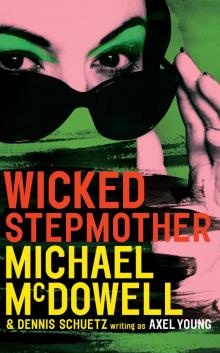 Wicked Stepmother
Wicked Stepmother Blackwater: The Complete Caskey Family Saga
Blackwater: The Complete Caskey Family Saga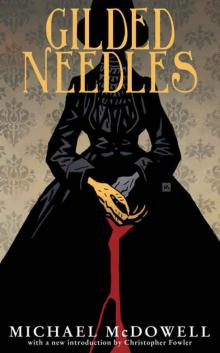 Gilded Needles (Valancourt 20th Century Classics)
Gilded Needles (Valancourt 20th Century Classics)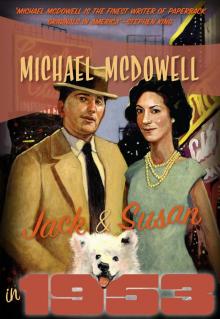 Jack and Susan in 1953
Jack and Susan in 1953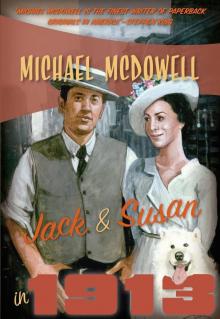 Jack and Susan in 1913
Jack and Susan in 1913 Rain
Rain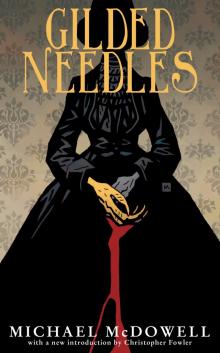 Gilded Needles
Gilded Needles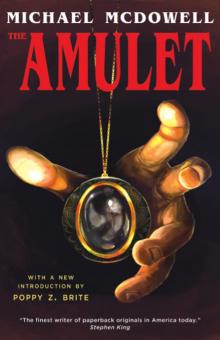 The Amulet
The Amulet Cold moon over Babylon
Cold moon over Babylon The Elementals
The Elementals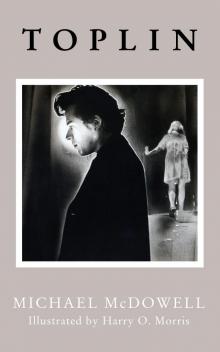 Toplin
Toplin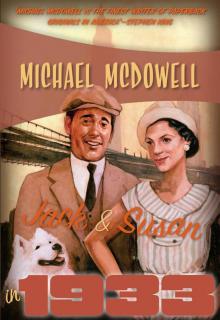 Jack and Susan in 1933
Jack and Susan in 1933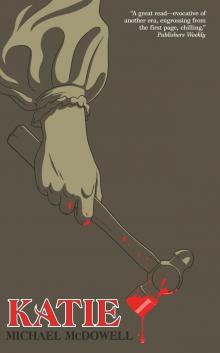 Katie
Katie The Valancourt Book of Horror Stories
The Valancourt Book of Horror Stories